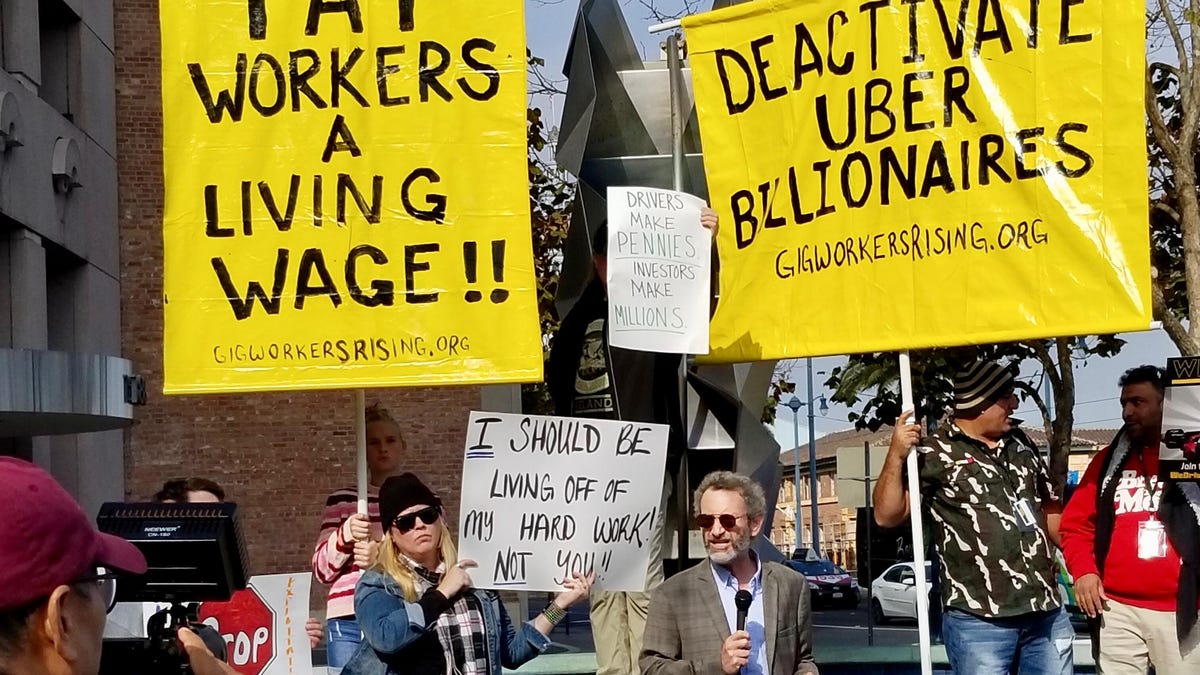Proposition 22, backed by Uber and Lyft, passes. Drivers say they'll keep fighting
A $205 million campaign comes to an end.

Ride-hail drivers and labor advocates have held several protests against gig economy companies over the years.
The possibility of gig workers being classified as employees in California is over. Uber, Lyft and other gig economy companies declared victory on Wednesday after pouring more than $205 million into their effort to have voters pass Proposition 22, a ballot measure they authored that exempts them from a state law requiring them to treat workers as employees.
Neither side, however, says the struggle is over, even if the campaign is.
"We always knew that the fight for gig workers' rights was going to be a long one," said Cherri Murphy, a former Lyft driver who organizes for Gig Workers Rising, a driver advocacy group. "They may have won this round, but we're in this for the long haul."
The issue of gig worker classification goes back to 2013, when Uber and Lyft were targeted in several lawsuits that sought more protections for workers. The companies settled those suits by offering concessions to workers, though not reclassifying them as employees.
California also tried tackling gig worker classification by passing a law last year, known as AB5, which requires some companies to reclassify independent contractors as employees. After the law was signed, several gig economy companies said the law could hurt their businesses with added costs, so they fought back with Proposition 22. The ballot measure creates an alternative to the employment model and is framed as a way to maintain independent contractor classification, while also bringing a few more protections.
"California voters agreed that instead of eliminating independent work, we should make it better," an Uber spokesman said in a statement Wednesday.
Lyft and DoorDash signaled they're prepared to bring the alternative employment model to other states.
"Lyft stands ready to work with all interested parties, including drivers, labor unions and policymakers, to build a stronger safety net for gig workers in the US," Anthony Foxx, Lyft's chief policy officer, said in a statement Wednesday.
DoorDash CEO Tony Xu said, "Now we're looking ahead and across the country, ready to champion new benefits structures that are portable, proportional and flexible."
Expected to be a closer race, Proposition 22 won with an overwhelming 58% of the vote in California. Exit polls showed that 40% of people who voted yes on the ballot measure believed they were supporting gig workers in getting a living wage.
During the campaign, with their multimillion-dollar war chest, the companies blanketed the state in ads, mailers, emails and text messages. They hired roughly two dozen political consultants known for no-holds-barred tactics. Those tactics included digging up dirt on labor activists, paying drivers to appear in tug-at-your-heartstrings advertisements and hiring firms to conduct studies with favorable data for the campaign.
Proposition 22's win appeared to please investors, with Uber and Lyft rallying at least 15% and 18%, respectively, on Wednesday.
For the gig workers and labor activists who opposed the ballot measure, however, the results of the campaign were chilling.
"We are deeply concerned about the result of Prop 22, which threatens to create a class of workers scraping to get by," Lena Simet, senior poverty and inequality researcher at Human Rights Watch, said in a statement on Wednesday. "We'll continue to closely monitor and document the impact of Prop 22 and the policies and practices of gig companies on workers' rights and livelihoods."

